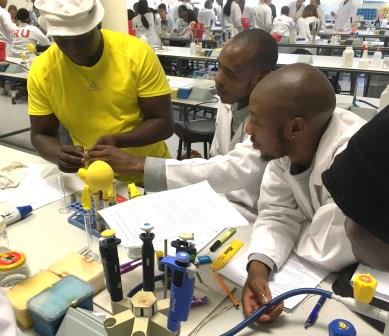
Service learning is a form of experiential learning in which students receive academic credit for addressing human and community needs in a way that benefits both provider and recipient of the service” (Ruksana Osman and Nadine Peterson, “Service Learning in South Africa”, Oxford University press, 2013).
As part of the university’s commitment to engaging with and uplifting our local community, the Science Faculty has developed a “Service Learning” programme involving a number of disciplines, including not only our department, but also that of Chemistry, Zoology and Entomology, Human Kinetics and Ergonomics, Physics and Electronics and Statistics. The faculty will team up with the Education Department at Rhodes as well as the Mobile Science Laboratory (MSL) and the Grahamstown Area Distress Relief Association (GADRA) for this worthy initiative. The purpose of the programme is to assist three local under-resourced township schools, Nombulelo, Samuel Ntsika and Mary Waters, in improving the quality of their Natural Science education, in particular their ability to carry out the practical demonstrations in the Grade 8 and 9 syllabuses.This "teaching the teacher" model is considered to be a more sustainable intervention in terms of improving basic education in our township schools. Teachers from the aforementioned schools in eRhini township joined Dr Jo de la Mare and her Biochemistry 3 students in their practical session on the 26th of February where the students demonstrated a particular Grade 8 practical, namely the investigation of the effect of sugar on the rate of fermentation in yeast. The hope is that the teachers will have gone back to their schools armed with the expertise gained and, assisted by GADRA and the MSL, enabled to carry out the practical with their relevant classes.
There was also a call for student volunteers to go to the schools and assist with the practical. This initiative gave students the opportunity to make a meaningful contribution to their local community, in particular towards the education of learners who may be significantly less fortunate than them in terms of their access to quality basic education. It also allowed them to experience high school Natural Science education from the other side of the desk i.e.as mentors not learners. In addition, the initiative exposed the students to the realities of a career as a Natural Science teacher, the latter being in very high demand and short supply in South Africa.
For more information about the programme, please contact Dr Jo-Anne de la Mare
